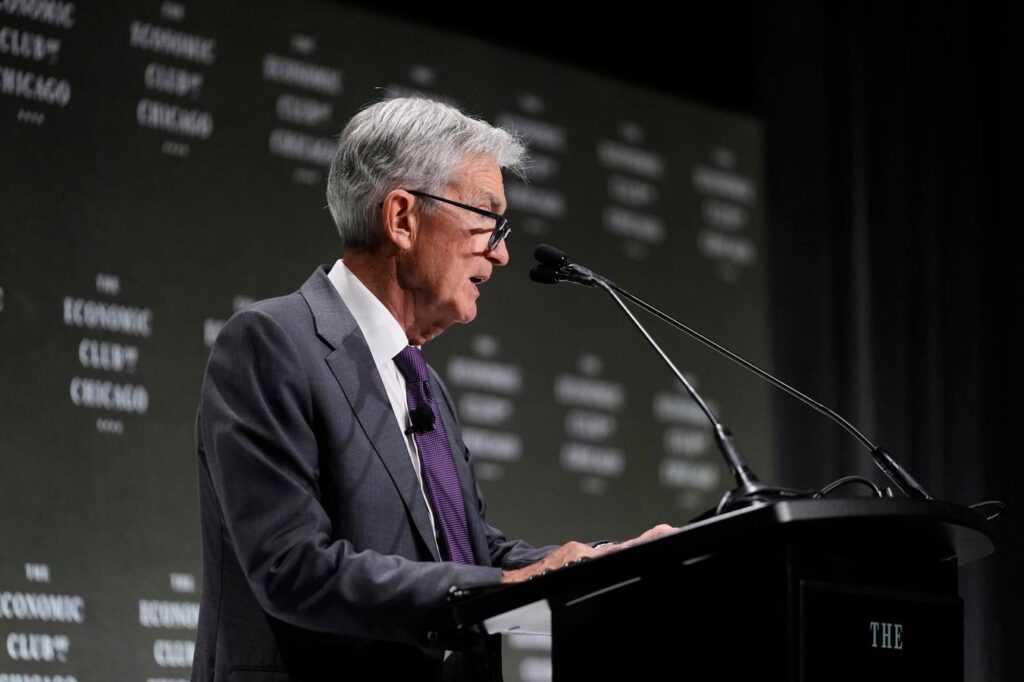President Trump has made critical comments about Federal Reserve Chair Jerome Powell’s performance in recent weeks. Trump wrote that, “there can be a SLOWING of the economy unless Mr. Too Late, a major loser, lowers interest rates, NOW.” Trump made these comments on social media on April 21. Although Powell’s term does not end until May 2026 and Powell was originally appointed by Trump, prediction markets see around a 20% to 25% chance that Powell is removed this year according to Polymarket and Kalshi.
Waiting For Economic Data
Trump wants lower interest rates immediately. Powell, and perhaps most policymakers on Federal Open Market Committee are inclined to wait for incoming economic data given the currently heightened economic uncertainty.
For example Powell said in a speech on April 16 that, “For the time being, we are well positioned to wait for greater clarity before considering any adjustments to our policy stance.”
Would Powell’s Removal Make A Difference?
It is also unclear if removing Powell in isolation would change policy because many voting members of the FOMC have expressed similar views, and recent decisions on interest rates have been unanimous. Christopher Waller did favor a different approach to managing the Fed’s balance sheet at the most recent meeting on March 19, but both 2025 decisions in January and March saw all policymakers vote to hold interest rates steady at their current level of 4.25% to 4.5%.
The Value Of Central Bank Independence
Greater independence of central banks in setting monetary policy has been a broad trend since the 1980s. Without an independent central bank, politicians would often set or influence interest rates directly. Academics have generally found that independent central banks better control inflation than politicians do, and that the trend towards independent central banks globally has generally expanded in recent decades
For example, a recent paper ‘Long Run Inflation: Persistence and Central Bank Independence’ found that central bank independence tends to lower inflation over the long run. That may be because independent central banks can have more of a long-term orientation and a greater willingness incur some pain of higher interest rates to achieve the benefit of lower inflation. In contrast, politicians are often concerned about the next election, which can lead to more of a short-term mindset such as a reluctance to raise interest rates when it’s needed.
Some Alignment Of Views
Despite the apparent conflict, it does not seem Trump and Powell’s views are too divergent. It does seem rates will move lower in 2025, even if no cut is expected in May. Markets expect that the FOMC will most likely cut interest rates in June, and in various speeches policymakers have signaled that they will cut interest rates further if the economic data merits it.
Still, even if the overall path for interest rates may be broadly similar, markets, which dropped after Trump’s attacks on Powell, appear concerned that the weakening of an independent central bank may be a negative for the U.S. economic stability as a whole, regardless of the path for interest rates.
Can Powell Be Fired?
The topic may also be moot. At a press conference on November 7 2024, Powell was asked by Andrew Ackerman of the Washington Post, “Do you believe the President has the power to fire or demote you, and has the Fed determined the legality of a President demoting at will any of the other Governors with leadership positions?” Powell responded curtly. “Not permitted under the law.”
Read the full article here


